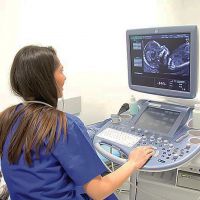
DR. PETYA CHAVEEVA
Fetal medicine specialist, Medical center “Dr. Shterev”
Dr. Chaveeva graduates Sofia Medical University in 2007. In 2006 - 2007, she attends a workshop lead by Assoc. Prof. A. Shterev and this convinces her to be trained and work with the team of “Dr. Shterev” Hospital. In 2008, after winning a competition, Dr. Chaveeva becomes a trainee in obstetrics and gynecology at 1 st SAGBAL “St. Sofia”. At present, she is balancing between her residency and her work at “Dr. Shterev” Hospital.
From 2010 until 2013, Dr. Chaveeva undergoes three-year full time intensive training course under the supervision of one of the worldly renowned fetal medicine specialists Prof. Kypros Nicolaides at King’s College Hospital, London. The course was in the following areas: first trimester screening test Down Syndrome, fetal morphology between 19-23 gestational week, fetal echocardiography with a legalized certificate from Professor Lindsay Allen, high risk pregnancy follow-up and giving recommendations for the mode and time of delivery based upon a number of parameters.
Dr. Chaveeva is also a well-trained specialist in invasive diagnostic procedures during pregnancy – chorionic villus sampling (in high-risk patients with Down syndrome or other chromosomal anomalies), amniocentesis. She is also the first Bulgarian doctor, who has been trained in micro-invasive laser fetal surgery.
Dr. Chaveeva, how many visits to a fetal medicine specialist a pregnant woman should have?
Firstly, I would like to say that pregnancy follow-up is crucial for every pregnant woman. We, at “Dr. Shterev” Hospital, are offering several package options for a pregnancy follow-up and prenatal care depending on the bundle of services included in each package. Almost every pregnant woman is referred to us, the fetal medicine specialists, for further investigations.
And another thing, we would like to see our patients at 11-13 gestational weeks, the time of the first trimester screening test. The importance of this screening program is to know everything about the development of the pregnancy since its very beginning. This is the time when we define which pregnancy is of high risk for chromosomal abnormalities and not only, but also we could detect a high risk pregnancy in terms of adverse pregnancy outcome such as preeclampsia or pre-term labor. The 11-13 weeks scan is the time when we offer our patients a very detailed scan about the fetal aneuploides as well as structural defects and adverse pregnancy outcome. Here, I would like to point out that this type of pregnancy care should be offered only by certified fetal medicine specialists.
The next scan when we need to see our patients is between 18-24 gestational weeks. This is the time when we need to see how the fetus has been developing in order to exclude any structural defects. We need to know that the heart, the face, the limbs and all the anatomy of the baby are well established so far. And not only, but this is the time when we are going to check the placenta’s function and to predict if there is any chance for the development of preeclampsia or a small pro-gestational age baby along with its survival length. The next scan is at 32 weeks of gestation, when we are assessing the fetal well-being, having special Doppler assessment of different organs and systems. We assess how the baby is feeling inside, if there are any complications such as, for example, a very small starving baby. This enables us to predict when we are going to deliver the baby, something very important both for the obstetrician and the mother.
Nowadays when we are facing in reality women who are getting pregnant much more older than in the last century, we are facing much more with those social chromosomal anomalieslike Down Syndrome – we know the higher the mother’s age, the higher the chance of having aneupliodes and more complicated pregnancies. This makes the importance of the fetal medicine scans even more important.
Having those three special scans, we are able to reassure not only our colleagues that are referring the patients to this special care but also the mothers. They need to know everything about their pregnancy development and outcome. Therefore it is very important to have these three scans with a specialist who is certified in fetal medicine together with the appropriate equipment for performing these tests.
Which patients, according to you, should undergo these three pregnancy scans?
Initially, I would say that all pregnant women need to have these tests performed and it is completely necessary and has already become part of the routine assessment all over Europe. These three scans should be implemented and carried out on a regular basis in Bulgaria as well. We, at “Dr. Shterev” Hospital, offer these tests to every pregnant woman that has chosen to have her pregnancy follow-up with us.
What happens when in the course of the pregnancy and the tests, a certain problem has been diagnosed?
If we classify the pregnancy like high-risk, we need to undertake further steps. What are the steps? We know very well from the first trimester which pregnancy are going to be qualified as high risk for chromosomal anomalies such as Down syndrome, and then we are referring to chorion visllus sampling (CVS). If we establish the high-risk pregnancy in terms of adverse complications like pre-term labour or preeclampsia, then we are able to give an option of management, either surgical treatment or giving certain medication like progesterone or aspirin to prevent a development of preeclampsia. So our target is to have the 11- 14 week scan in order to exclude chromosomal abnormalities.
This is the place and time when you have to face the fetal medicine specialist. Luckily, at “Dr. Shterev” Hospital all pregnant women have these options at their disposal.
9771